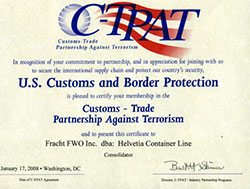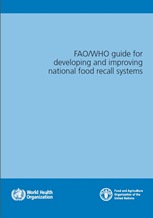Supply Chain Security
Food Security is the responsibility of all stakeholders involved in the supply chains
The application of policies, procedures, and technology to protect supply chain assets (product, facilities, equipment, information, and personnel) from theft, damage, or terrorism and to prevent the introduction of unauthorized contraband, people, or weapons of mass destruction.
 The food chain is an easy vulnerable target and a terrorist attack could have devastating consequences wrecking havoc on both developed and undeveloped nations affecting an enormous amount of people while impacting various economies that are all ready at risk of collapse. Governments take this threat seriously but when it comes to protection, difficulties arise from the sheer complexity of our food systems and the variety of ways in which it is produced and distributed. Governments and companies need to do more to ensure our food supply is safe and secure, it is necessary for all stakeholders to work together to reinforce the security management in different sections of the food supply. New technologies have emerged to help improving tracking and traceability, to ensure consumers are protected in case tampering or bio-threat. Full food traceability is required for all producers to ensure unsafe food is removed or withdrawn from the food supply along with providing effective and accurate communication of potential threats to consumer.
The food chain is an easy vulnerable target and a terrorist attack could have devastating consequences wrecking havoc on both developed and undeveloped nations affecting an enormous amount of people while impacting various economies that are all ready at risk of collapse. Governments take this threat seriously but when it comes to protection, difficulties arise from the sheer complexity of our food systems and the variety of ways in which it is produced and distributed. Governments and companies need to do more to ensure our food supply is safe and secure, it is necessary for all stakeholders to work together to reinforce the security management in different sections of the food supply. New technologies have emerged to help improving tracking and traceability, to ensure consumers are protected in case tampering or bio-threat. Full food traceability is required for all producers to ensure unsafe food is removed or withdrawn from the food supply along with providing effective and accurate communication of potential threats to consumer.
Areas of focus required for establishing and improving food security standards
- Establish comprehensive food quality evaluation and inspection systems and food safety certification systems
- Promote integrated supply chain security management in food enterprises and improve their management competencies
- Strengthen the construction of food supply chain cold facilities and improve food logistics services.
- Actively push the application of product tags and tracking and tracing systems
- Compare capabilities, competencies and performance across firms in the food supply chain
- Implement measures for improving food security
Necessary requirements for supply chain security
- Preventing any biological, chemical or unauthorized agent to be incorporated into the product
- Preventing disruptions of the supply chain network/infrastructure
- Preventing any illegal commodity to be intermingled with the shipment
- Preventing unauthorized access to the product and/or supply chain network
- Preventing transportation assets or a shipment’s contents to be used illegally or as weapon
- Reacting to unexpected disruptions quickly in order to restore normal operations
C-TPat Customs – Trade Partnership Against Terrorism
http://www.cbp.gov/xp/cgov/trade/cargo_security/ctpat/
C-TPAT Supply Chain Security Best Practices Catalogue:
CIP: Carrier Initiative Program (Industry Partnership Programs)
The Carrier Initiative Program (CIP), established in 1984, is a joint effort among air, sea, land and rail carriers and the U.S. Customs and Border Protection to address the problem of drug smuggling and terrorism in the United States on board commercial conveyances. By signing the CIP agreement with the U.S. Customs and Border Protection, carriers agree to enhance their security at foreign and domestic terminals as well as on board their conveyances. Additionally, they agree to cooperate closely with the U.S. Customs and Border Protection in identifying and reporting attempted or suspected smuggling attempts or other criminal activity.
In return, CBP agrees to conduct both domestic and foreign security site surveys, post seizure analysis, and provide training to identify security weaknesses within their company and suggests improvements to better their security systems and measures.
http://www.cbp.gov/xp/cgov/trade/cargo_security/carriers/ipp.xml
http://www.cbp.gov/xp/cgov/border_security/international_operations/partnerships/cip.xml
SCIP: Super Carrier Initiative Program
The Super Carrier Initiative Program is for those carriers that face an extraordinarily high risk from drug traffickers. CBP and various carriers have signed over 3,800 Carrier Initiative Agreements and 27 Super Carrier Agreements.
BASC: Business Anti-smuggling Coalition
The Business Alliance for Secure Commerce (BASC) is a private sector led and controlled coalition that has been supported by U.S. Customs and Border Protection (CBP) since its creation in 1996. As a non-profit organization incorporated in the State of Delaware as the World BASC Organization, the BASC is an international business alliance created to promote supply chain security in cooperation with government agencies and international organizations.
The BASC was created to address the problem of concealing contraband in commercial trade. As a voluntary program for businesses, with no government-imposed mandates, corporate participants are expected to follow BASC’s security standards which are designed to significantly improve their security practices and in the process deter contraband smugglers and terrorists from using their companies to introduce contraband and implements of terror in legitimate shipments.
The BASC program examines the entire process of manufacturing and shipping of merchandise from foreign countries to the United States, emphasizing the creation of a more security-conscious environment throughout the supply chain. The BASC currently has over 2,500 companies that have been certified by the organization. And it operates in 12 countries of Latin America and the Caribbean: Colombia, Costa Rica, Ecuador, El Salvador, Guatemala, Haiti, Mexico, Panama, Peru, the Dominican Republic, Uruguay, and Venezuela.
http://www.cbp.gov/xp/cgov/border_security/international_operations/partnerships/basc.xml
ISO/PAS 17712: Standards for High-Security Seals
This document brings attention to the existing statutory requirement by which all containers in transit to the United States are required to be sealed with the seal meeting the ISO/PAS 17712 standard and specifies the date on which the requirement shall take effect:
http://www.stoffel.com/m-135/iso17712sealrequirement.aspx
http://www.stoffel.com/m-135/iso17712sealrequirement.aspx
http://www.setonresourcecenter.net/transportation/publications/CTPAT-Brooks.pdf
Supply Chain Security Management Systems (ISO 28000:2007)
As the legal and regulatory environments have evolved over the past ten years, organizations have started to address the need for heightened security within global supply chains.
What is ISO 28000:2007?
Published by the International Organization for Standardization (ISO) in September 2007, the ISO 28000:2007 standard specifies the requirements for a supply chain security management system, linking security management to many other aspects of business management. These aspects would include activities controlled or influenced by organizations that impact supply chain security, such as transportation of goods along the supply chain. ISO 28000 certification applies to all organizations that would like to implement a security management system and integrate their security management into their overall quality management system such as small companies or large multinationals in the manufacturing, service, storage, or transportation sector.
Benefits of ISO 28000 Certification
An ISO 28000 certificate of compliance provides the following key benefits:
- Allows security to be managed as a process so that the effectiveness of security management can be measured and improved.
- Allows management to focus resources and efforts on areas with high-risk concerns (through security risk assessment).
- Allows management to benchmark its security management efforts with international standards.
- Demonstrates to stakeholders the commitment to enforce a systematic security management.
ISO 28000 uses a more pragmatic approach in which the risk levels of your supply chain operations are identified. It enables your organization to perform a risk assessment with supporting management tools (i.e. document controls, key performance indicators, internal audits and training) and applies the controls in accordance with the risk involved. The framework of ISO 28000:2007 is structurally very similar to ISO 14001:2004 Environmental Management Systems (EMS) standard. The environmental aspects identification and evaluation process in EMS is analogous to security risk assessment in security management. Various companies offer a wide portfolio of solutions, including training, gap assessments, customized audits and certifications that can reinforce your security management systems and protect your brands and products as they make their way through international supply chains. It is important to look for security auditors who are fully equipped in helping you meet your supply chain security requirements.
To have more articles like this emailed to your inbox, become a GFSR Member today!

-
 FeaturedRisk management
The Cost of a Breach: What a Cyberattack Could Mean for Food Safety Recalls
FeaturedRisk management
The Cost of a Breach: What a Cyberattack Could Mean for Food Safety Recalls
-
 FeaturedRisk management
Securing the Food Chain: How ISO/IEC 27001 Strengthens Cybersecurity
FeaturedRisk management
Securing the Food Chain: How ISO/IEC 27001 Strengthens Cybersecurity
-
 FeaturedRisk management
Revolutionizing Food Safety Training: Breaking Out of the “Check-the-Box” Mentality
FeaturedRisk management
Revolutionizing Food Safety Training: Breaking Out of the “Check-the-Box” Mentality
-
 GFSI Standards
GFSI 2025: Building Trust, Tech-Forward Solutions, and Global Unity in Food Safety
GFSI Standards
GFSI 2025: Building Trust, Tech-Forward Solutions, and Global Unity in Food Safety
-
 FeaturedFood Safety
Integrated Pest Management: Strategies to Protect Your Brand’s Reputation
FeaturedFood Safety
Integrated Pest Management: Strategies to Protect Your Brand’s Reputation
-
 FeaturedFood Safety Culture & Training
No Open Door Policy: Challenges That Impact Pest Control in Food Processing Plants
FeaturedFood Safety Culture & Training
No Open Door Policy: Challenges That Impact Pest Control in Food Processing Plants



